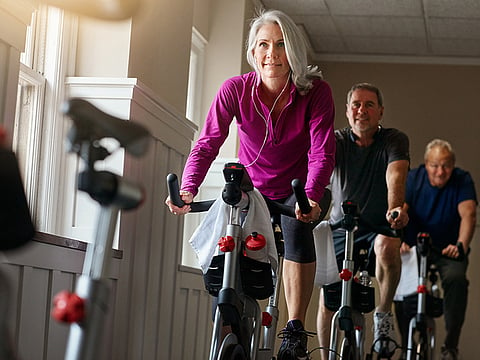Ageing gracefully
The choices you make can have a serious impact on your health and fitness in later life

On Saturday mornings I wake up and head straight to the gym only to find myself half as fit as a middle-aged couple. They always exercise together. Sometimes they even bring their children to class and I often watch them play with their grandchild after class.
Honestly, they inspire me more than a model with a six-pack. The reason is not that I underestimate the will and perseverance it takes to build an enviable body. The reason is that I aspire to have the drive, consistency and passion to work out and stay healthy through my thirties and beyond. Moreover, I want the drive to stem from the desire to stay fit rather than to fit into a dress size.
Ageing populations
According to World Health Organisation’s The World report, “The ageing of populations is rapidly accelerating worldwide. For the first time in history, most people can expect to live into their 60s and beyond. The consequences for health, health systems, their workforce and budgets are profound. A child born in Brazil or Myanmar in 2015 can expect to live 20 years longer than one born in those countries just 50 years ago. When combined with the marked falls in fertility occurring in almost every country, these trends are having equally significant impacts on the structure of populations.”
Globally, public health systems and governments are working on chalking out policies to foster and promote healthy ageing; they are trying to create an infrastructure and environment to support healthy ageing. At an individual level, the question is how someone in their mid-thirties or forties can support the concept of healthy ageing.
Dr Mona Sobhy, Geriatrician at DHA’s primary healthcare clinic, said, “The lifestyle you lead, particularly in your 30s and 40s, has a huge impact on the way you will age and the diseases you may develop. Chronological age is the number of years a person has lived while biological age refers to how old a person seems. Often we see patients in their 40s but their biological age is in their fifties or even sixties. Mostly, the reason is unhealthy lifestyle. People need to exercise on a regular basis and try to stay clear of lifestyle diseases.
“If they have these diseases such as diabetes, managing it to prevent complications should be a top priority. If they lead a healthy lifestyle, they can ensure they age as slowly as possible and with the least amount of diseases.
“Additionally, regular yearly screenings is highly recommended to provide the patient with a snapshot of his overall health so that they can take the steps necessary to avoid developing diseases or detect diseases early on and manage them effectively,” says Sobhy.
Yearly screenings must begin at the age of 30 itself and even earlier in case of a family history of certain diseases such as cancer, says Dr Sobhy. “The importance of regular comprehensive screening is that it highlights the red flags early so that people can take steps to prevent the onset of disease or if a disease is detected, they can begin treatment early on, rather than after complications have set in. In addition to regular screenings, people must ensure they take the vaccinations that are recommended by their doctors. For example, women need to take the HPV vaccine to protect against cervical cancer and despite taking this vaccine they must opt for regular cervical cancer screenings.”
Staying active
Sobhy added that while regular screenings will present an overall health report and help people take necessary medical steps, on a daily basis, following a healthy lifestyle is key. “Exercise is the number one anti-ageing medicine. I always tell my patients, there are no short cuts; they have to make time to exercise. Exercise is a great anti-stressor; it improves circulation, which in turn improves skin complexion. It helps maintain healthy body weight, increases bone density and helps build muscle. It also strengthens the heart and can reduce the risk of certain cancers. We lose 4 per cent of muscle mass every 10 years after the age of 20; therefore weight training in addition to other forms of exercise is important to build bone density, which helps prevent diseases such as osteoporosis later on in life.”
Dr Haitham Hassan, Geriatrician at Seniors’ Happiness Centre at DHA, said: “In addition to exercise, how much we rest, how well we sleep and what we eat are all factors that will decide the future of our health and how we age. It is not just genetics; people need to understand that lifestyle is crucial.”
A study published in the journal Nature in 2017 aimed to consolidate our understanding of which genetic and lifestyle factors have a significant impact on how long we can expect to live. According to the study, on average, smoking a pack a day reduces lifespan by seven years, while losing 1kg of weight will increase your lifespan by two months.”
Dr Hassan, adds, “Food has a deep impact on our health. If people want to age well and prevent the effects of early ageing, they need to think about health from inside out, rather than focus on quick fixes.”
Alia Abdulrehman, Clinical Dietician, PHC at DHA suggests that people should increase their intake of green vegetables, fish and healthy fats. “Processed foods, sugar and carbonated drinks should be completely avoided. Some foods to pay emphasis to include green leafy vegetables, fatty fish, unsalted nuts, all berries and avocado.”
Ageing is more than skin deep, so regardless of how you look, most professionals will agree that lifestyle choices such as healthy eating, exercise and plenty of rest are the key to optimising your chances of living healthily through middle age and beyond.
Sign up for the Daily Briefing
Get the latest news and updates straight to your inbox

